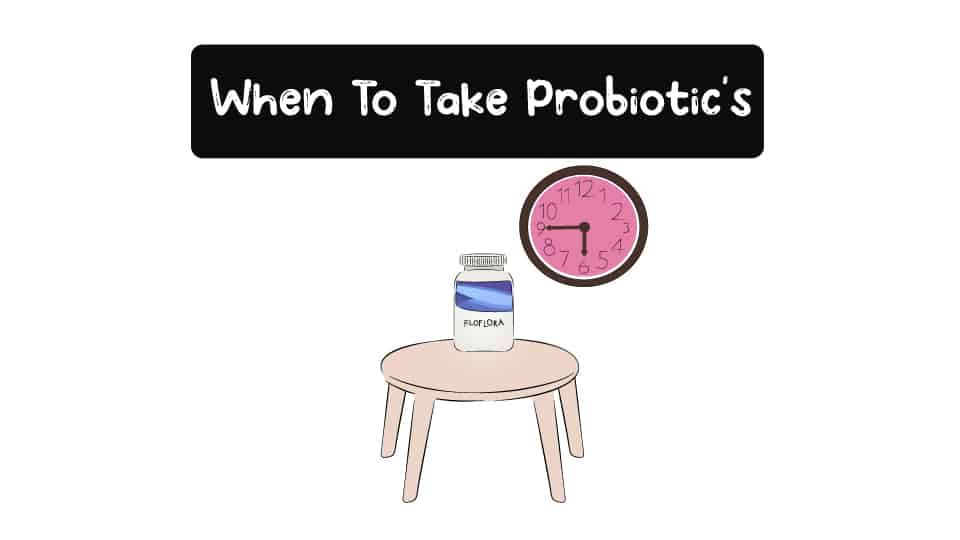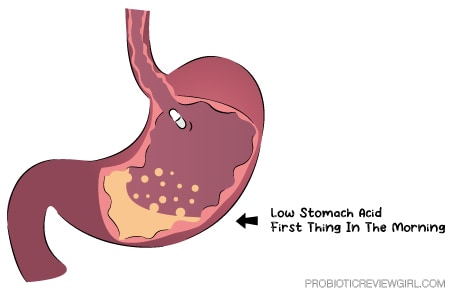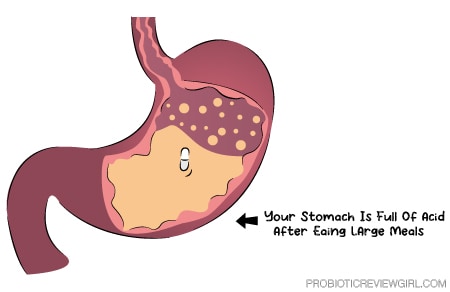When Is The Best Time To Take Probiotics?

According to studies, it has been determined that the best time for consuming probiotics is early in the morning before having breakfast, or right before bedtime.
30 minutes before breakfast is the best time to take probiotics because your stomach is most empty allowing the probiotic bacteria to reach your gut most effectively.
A probiotic is a dietary supplement containing beneficial bacteria like Lactobacillus that naturally occur in the intestinal tract.
What Happens When You Take Probiotics On An Empty Stomach?

Taking a probiotic on an empty stomach allows the probiotic bacteria to pass through the acidic environment of the stomach quickly and efficiently. The graphic above illustrates this point.
When you consume probiotics on an empty stomach, there is less food in the stomach to be digested, resulting in lower stomach acid production. This reduced acidity creates a more favorable environment for the probiotic bacteria to survive as they journey through the stomach. The probiotics can then move swiftly into the intestines, where they can colonize and provide their intended health benefits.
What Happens When You Take Probiotics On A Full Stomach?

When you take probiotics on a full stomach, the digestion process is already active, and the stomach is producing digestive enzymes and stomach acid to break down the food. This can potentially reduce the survival and effectiveness of the probiotic bacteria as they encounter a harsh acidic environment. The graphic shown above demonstrates this point clearly.
The probiotics may spend more time in the stomach before reaching the intestines, where they can provide their intended benefits. Therefore, it is generally recommended to take probiotics on an empty stomach to enhance their chances of surviving the stomach acid and reaching the intestines intact.
How Does Stomach Acid Kill Bacteria?
A 2006 study authored by A Rao, showed that stomach acid kills pathogens through the production of reactive nitrogen compounds, such as nitrous acid, peroxynitrite, nitrogen dioxide, and nitric oxide.
Probiotics and pathogens are both microorganisms, but while pathogens can cause harm and disease, probiotics are beneficial and support the overall health of the host.
The study found that the killing of pathogens by these reactive compounds was observed at pH 2 or 4, but not at pH 7, suggesting that the acidity of the stomach plays a crucial role in this process.
The significance of nitrite in killing bacteria may be influenced by the dilution of nitrite levels in the stomach.
Should You Eat Probiotics With A Meal?
You should not take probiotics with a meal. Taking probiotics with a heavy meal can reduce their effectiveness because the stomach acid produced during digestion, which kills pathogens, may also impact the viability of probiotics as mentioned in the previous paragraph.
Probiotics, being beneficial microorganisms, need to pass through the acidic environment of the stomach quickly to reach the intestines, where they can provide their health benefits.
Consuming a heavy meal delays the passage of food through the stomach, exposing probiotics to prolonged exposure to stomach acid, potentially reducing their survival rates.
Can You Take Probiotics Before Bedtime?
Yes, taking probiotics before bedtime can be advantageous as it allows them to bypass the acidic environment of the stomach and reach the intestines more effectively. When you consume probiotics before sleep, there is typically a longer duration between your last evening meal and the time you take the supplement.
For this to be true an interval of 2 to 3 hours, or even longer, must be kept for better separation between the consumption of probiotics and your last evening meal. Eating a heavy meal close to bedtime can slow down digestion and increase the amount of time food stays in the stomach.
As a result, probiotics present in the meal are exposed to the acidic environment of the stomach for an extended period, which can reduce their effectiveness or even destroy them. Waiting for a few hours after dinner before taking probiotics allows your digestive system to properly process the meal, reducing the acidity levels in the stomach. This creates a more favorable environment for the survival and efficacy of the probiotics when you eventually consume them.
can You take probiotics every day?
Yes, taking probiotics every day is safe and recommended by the National Institutes of Health (NIH). Regular intake of Lactobacillus and Bifidobacterium probiotics can enhance gut health. It is advisable to take probiotics 30 minutes before breakfast on an empty stomach. Two reasons support daily probiotic use: Firstly, probiotics require time to reduce pathogenic bacteria, increase beneficial bacteria, and alleviate gut inflammation, typically taking 2 to 3 weeks to observe benefits. Secondly, daily life factors like antibiotics, chlorine, artificial sweeteners, stress, and certain medications can negatively impact the delicate balance of gut flora, making daily probiotic supplementation beneficial.
What Are The Probiotic Side Effects?
Probiotics generally have a good safety profile, but some individuals may experience mild side effects like gas, bloating, and digestive discomfort. These symptoms are usually temporary and subside as the body adjusts to the probiotic supplement.
In rare cases, probiotics can cause more severe complications in people with weakened immune systems or serious medical conditions. It's important to consult with a healthcare professional before starting probiotics, especially if you have underlying health issues or are taking medications.
How To Maximize Your Probiotic?
In addition to taking your probiotic first thing in the morning on an empty stomach, here are a few tips to maximize the effectiveness of your probiotic:
Dr. Sara Mesilhy has a Master’s degree in Gastroenterology and holds a membership with the Royal College of Physicians of the United Kingdom. She completed her Bachelor of Medicine, Bachelor of Surgery (MBBS) at Cairo University and is currently part of the ProbioticReviewGirl medical team.